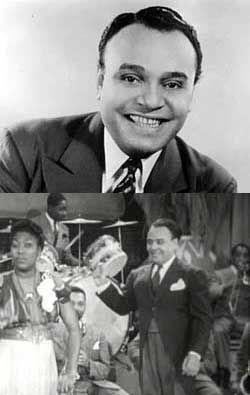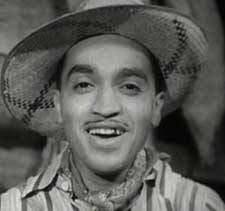 It's weird to see a sophisticated orchestra like Lucky Millinder's dressed up as country hicks, but that's their costuming for I Want a Big Fat Mama (1941), with the musicians in bib overalls & beautiful gals in print dresses running around in time to the music.
It's weird to see a sophisticated orchestra like Lucky Millinder's dressed up as country hicks, but that's their costuming for I Want a Big Fat Mama (1941), with the musicians in bib overalls & beautiful gals in print dresses running around in time to the music.
The tenor vocalist is a slim guy in a bumpkin straw hat singing a number that mixes jump-blues with boogie woogie:
"I want a big fat mama (yes indeed)/ I want a big fat mama (that's what I need)/ I want a big fat mama to tell my troubles to." It develops as a rather sweet number with sincere feelings for big women.
Barnyard boogie dances break out among the rural audience, including from a little kid & his big fat mama.
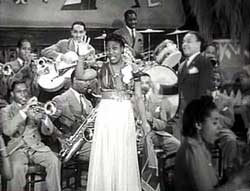 Sister Rosetta Tharpe gets the lead vocal in Four or Five Times (1941). She has a high pitched yet gorgeous voice full of infectious fun & highest jazz musicality with a retro hint of ragtime.
Sister Rosetta Tharpe gets the lead vocal in Four or Five Times (1941). She has a high pitched yet gorgeous voice full of infectious fun & highest jazz musicality with a retro hint of ragtime.
You can tell the whole band just loves to hear her sing, & Lucky can't take his eyes off her while he conducts the band.
"It's my delight/ Doing things right/ Four or five times" has such a distinct double entendre to it that's it not really double, it's just flat out sayin' it. That Lucky & much of the band is grinning ear to ear makes Sister Rosetta's serious demeanor all the funnier.
At the instrumental break there's a short stockilly built couple who do a boogie woogie spectacularly well; they simply had to have been famous dancers, but not identified. Other first-rate dancers follow, it's amazing to watch.
I love soundies though some of 'em ain't that great, but now & then there's one that is pure art, & Four or Five Times is simultaneously pure art & pure joy.
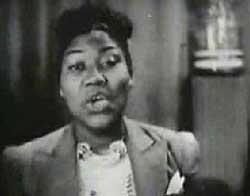 Sister Rosetta Thorpe was a pioneer of turning gospel into popular jazz. Not everything she sang had any relationship to gospel, but usually the vocal influence & often the lyrics as well draw on gospel traditions.
Sister Rosetta Thorpe was a pioneer of turning gospel into popular jazz. Not everything she sang had any relationship to gospel, but usually the vocal influence & often the lyrics as well draw on gospel traditions.
When her brand of jazz became less & less commercial disiplaced by rhythm & blues, doowop, & rock & roll, she reverted to gospel & continued to have a sparkling career into old age, right into the hippy era when as an old woman with a big electric guitar she retained cross-over appeal even with the church-singing.
She sings the title song of the soundie Lonesome Road (1941) backed up by Lucky Millinder & His Orchestra. The lyrics begin: "Look down, look dow-own, that lonesome road before you travel on/ Look up, look up, & see your maker, before Gabriel blows his horn..."
At the instrumental break, with solos by Pazuzza Simon & Stump Brady, four chorus girls in skimpy outfits dance to Lucky's band. Momentarily, a fast-moving dance couple rushes in to add to the layers of visual appeal.
As the instrumental break comes to an end, Sister Rosetta on the highest high note gives an expansive jump-jazz take to close the number. In all, this is one of the high-end soundies for thrilling entertainment visually & musically.
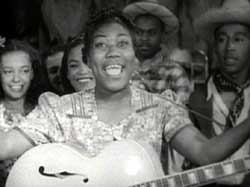 Shout Sister Shout (1941) gives us Sister Rosetta Tharpe once again singing for Lucky Millinder & His Orchestra.
Shout Sister Shout (1941) gives us Sister Rosetta Tharpe once again singing for Lucky Millinder & His Orchestra.
We're back at that foolish set seen for I Want a Big Fat Mama, with the orchestra decked out in hillbilly outfits in the barn. Yet there's an urban jump-jazz beat going on. Rosetta is holding her famously enormous guitar, though oddly she never plays it. She begins singing:
"Listen everybody to the precious word/ I'm going to do some chirpin' & I ain't no bird/ There's a reason for living, a reason for dying/ There's a darn good reason why I wanna start crying..."
She may want to start crying but what a smile she has. And she can pass for a country bumpkin if she really wants to, with that high sweet voice, a squint & a grin, & a happy threat to kill her boyfriend if he's ever unfaithful, cuz there's a reason for everything.
Lucky shares the lyrics for a while: "I can understand the birds, I can understand the bees/ I can even understand why a rat eats cheese." Sister Rosetta puts in: "I can understand my dog!" It's just such an wonderful delightful comedy number but with true jazz spirit for good dancing. I swear, Sister Rosetta at the height of her jump-jazz years was the female Louis Jordan.
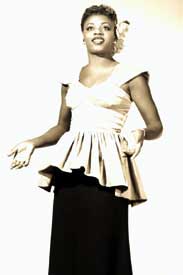 The soundie era was coming to an end by 1946 with less & less inclination to invest money on new product for the panoram visual jukeboxes which were no longer being manufactured, due to wartime restrictions on use of materials. The soundie era was coming to an end by 1946 with less & less inclination to invest money on new product for the panoram visual jukeboxes which were no longer being manufactured, due to wartime restrictions on use of materials.
There were methods of cutting corners dramatically on cost of new soundies, as when some of the numbers in Louis Jordan feature films were recycled as three-minute soundies.
William D. Alexander produced for Astor Picture Corporation, & Leonard Anderson directed, a one-reel musical short called simply Lucky Millinder (1946), & the Mills Panoram Company obtained the rights to it, broke it into three pieces, & had themselves three "new" soundies by one of the great bands of the time.
The three 1946 tunes are I Want a Man, Big Fat Mamas, & Hello Bill. For I Want a Man Annisteen Allen is the front gal for vocals.
From the mid '40s to the mid '50s, she was a signal part of the transition from big band jump-jazz to a new type of rhythm & blues that comes awfully close to rock 'n' roll. Her 1955 R & B hit "Fujiyama Mama" is indistinguishable from early rock, & it became an even bigger hit when Wanda Jackson rerecorded it as out & out rockabilly.
From 1947 to 1951, Lucky Millinder released several 78s with Annisteen singing for his orchestra, but when they made this soundie, they were only at the beginning of their association, & this may well be their first official recording together.
But Annisteen had already (in 1945) had a hit with "I Want a Man (Who's Going to Do Right)" recorded as by Annisteen Allen & Her Home Town Boys. Her Home Town Boys were apparently just a studio band, however, & she never toured with her own orchestra.
Lucky through these same years would have saxophonist Benjamin Clarence "Bull Moose" Jackson up front on vocals, as on Big Fat Mamas. Bull Moose originally been hired (in 1943) for his sax skills, but at a Texas gig vocalist Wynonie Harris vanished, & Bull Moose had to fill in on vocals in the emergency. From then on he had a simultaneous vocal career.
Although Lucky was one of the composers on "Big Fat Mamas (Are Back In Style Again)" it was a hit in 1943 hit for Bull Moose Jackson & His Buffalo Bearcats in 1943, Lucky one of its composers. The version with the Lucky Millinder Orchestra is very different, recorded in New York in 1946.
This is totally different from Lucky's I Want a Big Fat Mama. The subject of chubby-chasing was common enough in jump-jazz that Louis Jordan had one too, "I Like 'Em Fat Like That."
The lyrics for Big Fat Mama run in part: "You need a big fat mama & boys you can't go wrong/ A big fat mama to rule your happy home/ Listen, Mama, you gotta keep that double chin/ Because the big fat mamas & the little fat mamas are back in style again."
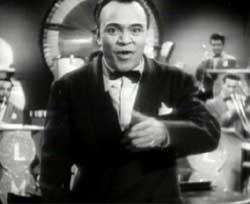 I don't know why Lucky didn't feature his own vocal stylings more often, though chances are he underestimated how good enough he was when he compared himself to some of the great singers he was able to attract to his band, which had included even Lena Horne & Ethel Waters. But for Hello Bill, Lucky sings that jump jazz number himself.
I don't know why Lucky didn't feature his own vocal stylings more often, though chances are he underestimated how good enough he was when he compared himself to some of the great singers he was able to attract to his band, which had included even Lena Horne & Ethel Waters. But for Hello Bill, Lucky sings that jump jazz number himself.
It's rendered slightly mellower than Louis Jordan or Cab Calloway would've done it, as Lucky has such a croony voice. Like a lot of jump-jazz the lyrics are both hip & funny:
"Hello Bill. Hello Bill. Come on Bill & get your thrill just jivin' with the boys/ Hello Bill. Hello Bill. Come hard licks & get your kicks just jivin' with the boys/ What do you say/ Are you still okay okay okay okay/ Well let's go back to the meetin' shack & play & play & play/ Hello Bill. Hello Bill. Shake my hand, that's solid man, just jivin' with the boys."
There's some call & reply interplay with the band, & a "two sax duel" launching the instrumental break, while Lucky hops, dances, prances, conducts. A trumpet solo ends the break & Lucky sings his soft upbeat jazz finale. Whadda talent!
copyright © by Paghat the Ratgirl
|
